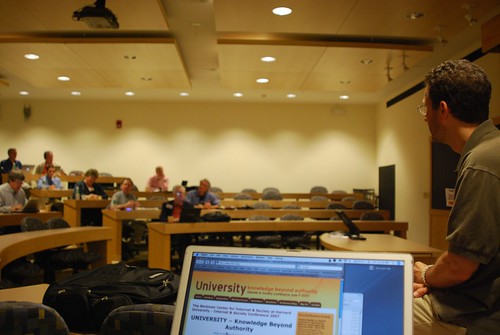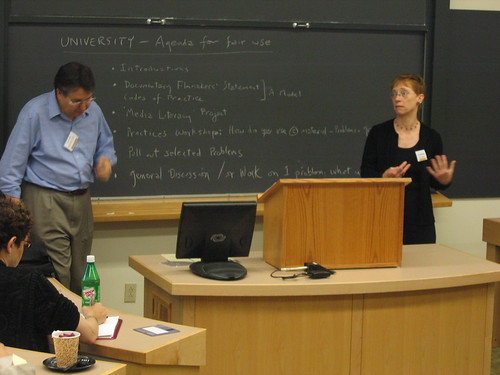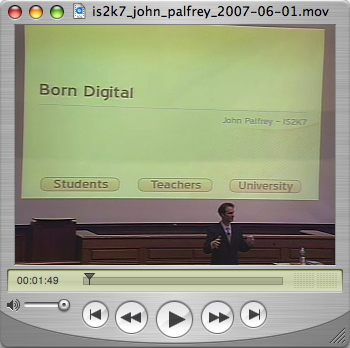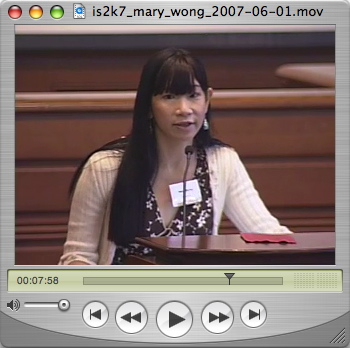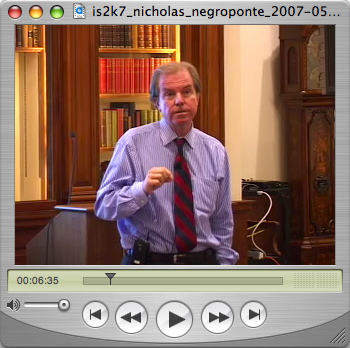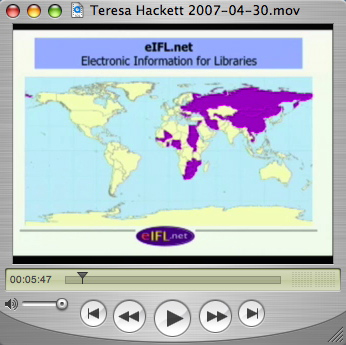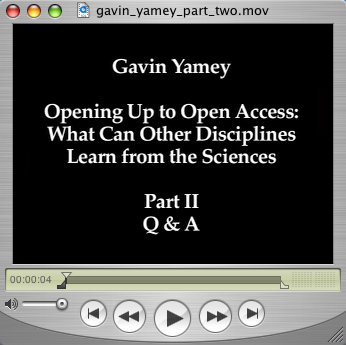Media
UNIVERSITY and the Digital Divide
Submitted by mediaberkman on June 21, 2007 - 10:56pm.There's been much discussion of open access to information, but that doesn't mean much to people who don't have access to the network at all. This working group addressed the role University can play in addressing digital divide issues, and how those issues relate to the other topics of openness.
Facilitator: Nolan Bowie (Senior Fellow, Berkman Center for Internet & Society and Adjunct Lecturer in Public Policy, Kennedy School of Government at Harvard University)
![]() Download the MP3 (time: 1:53:32).
Download the MP3 (time: 1:53:32).
- Login to post comments
Alternative UNIVERSITY Models for Scholarly Publications
Submitted by mediaberkman on June 21, 2007 - 10:42pm.Photo by macowell, via Flickr (CC license)
The ways in which professors, academics and students and professionals release their work into the world are changing. The old models of scholarly publishing, in which most work is turned over to a publishing company just to be purchased back by the Universities from which it originated, are challenged as the printing press is replaced by digital distribution. How can Universities progress open access models of scholarly publications through repositories, modes of licensing and support of open access journals?
Facilitators: Peter Suber (Public Knowledge/Earlham College), Stuart Shieber (Harvard University)
![]() Download the MP3 (time: 1:38:14).
Download the MP3 (time: 1:38:14).
Visit the Internet & Society 2007 wiki to learn more about this working group session.
- Login to post comments
UNIVERSITY Agenda for Fair Use
Submitted by mediaberkman on June 21, 2007 - 10:17pm.Photo by Colin Rhinesmith, via Flickr (CC license)
The Center for Social Media at American University and documentary filmmakers wrote a report on Best Practices in Fair Use to help navigate the waters of copyrighted materials and to determine when material use can be considered Fair Use. Much like documentarians, members of University communities are often riddled with questions as they create and express their work. How can we create Best Practices in Fair Use document for Universities similar to the one created for documentary filmmakers?
Facilitators: Lewis Hyde (Berkman Center Fellow), Patricia Aufderheide (Center for Social Media), Eric Gordon (Emerson College)
![]() Download the MP3 (time: 1:26:09).
Download the MP3 (time: 1:26:09).
Visit the Internet & Society 2007 wiki to learn more about this working group session.
- Login to post comments
John Palfrey Keynote at IS2K7
Submitted by mediaberkman on June 21, 2007 - 9:43pm.Professor John Palfrey, Executive Director of the Berkman Center for Internet & Society and Digital Natives Principal Investigator, presents the conference keynote on being "Born Digital" at Internet & Society 2007 on June 1.
- Login to post comments
Professor Mary Wong at IS2K7
Submitted by mediaberkman on June 21, 2007 - 9:39pm.Professor Mary Wong of Franklin Pierce Law Center presents a summary of Day One and looks ahead at Day Two of Internet & Society 2007 on June 1.
- Login to post comments
Introduction and Welcome to IS2K7
Submitted by mediaberkman on June 21, 2007 - 9:33pm.Professor Charles Ogletree, Executive Director of The Charles Hamilton Houston Institute for Race and Justice and Internet & Society 2007 Co-chair, kicks off the conference with a special welcome from Professor Charles Nesson, Berkman Center for Internet & Society Founder and Internet & Society 2007 Co-chair, on June 1.
- Login to post comments
Nicholas Negroponte Keynote at IS2K7
Submitted by mediaberkman on June 21, 2007 - 9:25pm.Nicholas Negroponte, Founder and Chairman of One Laptop per Child, presents the keynote address at this year's Internet & Society conference, University - Knowledge Beyond Authority on May 31.
- Login to post comments
IS2K7 Interview with Michael Hemment
Submitted by mediaberkman on June 21, 2007 - 8:52pm. Michael Hemment is Research Librarian and Head of Scholarly Research Initiatives at Widener Library, here at Harvard University. In April, MediaBerkman producer Colin Rhinesmith sat down with Michael to discuss a number of pressing issues in the research field.
Michael Hemment is Research Librarian and Head of Scholarly Research Initiatives at Widener Library, here at Harvard University. In April, MediaBerkman producer Colin Rhinesmith sat down with Michael to discuss a number of pressing issues in the research field.
![]() Download the MP3 (time: 22:55).
Download the MP3 (time: 22:55).
In this Internet & Society 2007 podcast, Michael discusses the available means of research at the University and how the sharing of information will change greatly from the way we understand it today. Some of the specific topics include copyright, fair use, tagging, digital imaging, open source materials, and more. All of these are central to the question of the role of University in Cyberspace - the theme of this year's Internet & Society Conference, Knowledge Beyond Authority.
- Login to post comments
Digital Libraries in Developing Nations
Submitted by mediaberkman on June 21, 2007 - 7:31pm.The role and mission of libraries is to collect, organise, preserve and make available the world's cultural and scientific heritage for current and future generations. Publicly funded libraries operating for the public benefit support access to knowledge, as well as education and training, critical to developing nations whose human resource is central to their advancement. Digital technologies are transforming the way that libraries work. What new opportunities are being created? What challenges do we face and how is eIFL.net addressing them?
Teresa Hackett runs eIFL-IP Advocacy for Access to Knowledge: copyright & libraries, a programme to raise awareness in copyright issues for libraries in 50 developing and transition countries. The goal is to build capacity and expertise amongst the eIFL.net library community and to represent the interests of members in key international policy fora such as WIPO, UNESCO and the WTO. Previously, Teresa was the Director of the European library association (EBLIDA), provided technical support to the European Commission library research programme and was part of the team to establish electronic information centres at the British Council Germany.
Teresa is currently an Expert Resource Person on the Copyright and Other Legal Matters Committee of the International Federation of Library Associations and Institutions (IFLA-CLM). She is a chartered librarian and in 2004 completed a post-graduate diploma in legal studies at the Dublin Institute of Technology.
This Fellows Luncheon Series event took place in May 2007 at the Berkman Center for Internet & Society at Harvard Law School.
- Login to post comments
Opening Up to Open Access - Part II
Submitted by mediaberkman on June 21, 2007 - 6:54pm.Gavin Yamey on "Opening Up to Open Access: What Can Other Disciplines Learn from the Sciences?"
What can academics do to ensure that their research results are included in the growing "knowledge commons?" Gavin Yamey MD, Senior Editor of PLoS Medicine and Consulting Editor of PLoS Neglected Tropical Diseases, shares his experiences in the open access movement and explores possible avenues for its expansion to other fields, with a focus on the social sciences and humanities.
The Public Library of Science, an international non-profit grassroots movement of scientists and physicians, is working to change the status quo by campaigning to make the biomedical literature a freely available global public good. PLoS now publishes 7 open access journals, and is urging traditional biomedical publishers to adopt more socially responsive practices. Will other fields follow in their footsteps?
This event was sponsored by the Berkman Center and Harvard College Free Culture and took place on Wednesday, March 14 at Harvard University.
- Login to post comments


